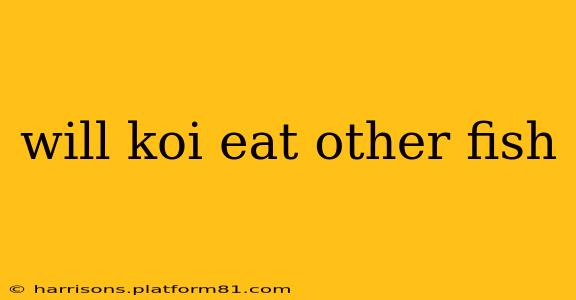Will Koi Eat Other Fish? A Comprehensive Guide to Koi Diet and Compatibility
Koi, with their vibrant colors and graceful movements, are beloved additions to many ponds and water gardens. However, a common question among prospective and current koi keepers is: will koi eat other fish? The answer, unfortunately, isn't a simple yes or no. It depends on several factors, including the size of the koi, the size and species of the other fish, and the overall environment of the pond.
What Do Koi Typically Eat?
Before diving into interspecies predation, let's understand koi's natural diet. Koi are omnivores, meaning they consume both plant and animal matter. Their diet typically includes:
- Commercial Koi Food: Specifically formulated pellets or flakes provide essential nutrients for healthy growth.
- Aquatic Plants: Koi will graze on algae and other aquatic plants in their environment.
- Insects: They readily consume insects that fall into the water.
- Worms: Earthworms and other aquatic worms are a nutritious treat.
However, this doesn't fully answer the question of whether they will eat other fish.
Will Larger Koi Eat Smaller Fish?
This is where the complexities arise. Larger koi are more likely to eat smaller fish. This isn't necessarily an act of aggression, but rather opportunistic feeding. If a small fish is slow, injured, or gets too close to a hungry koi, it could become a meal. Think of it like this: if a larger koi encounters a smaller fish it can easily swallow, it's more likely to do so than to ignore a readily available food source.
What Fish Are Safe to Keep with Koi?
Choosing compatible tank mates is crucial for a thriving pond ecosystem. While no fish is entirely safe from a very large, hungry koi, some species are less likely to become prey:
- Larger, Fast-Moving Fish: Fish that are too large for a koi to swallow, and are quick enough to evade them, have a better chance of survival. Consider fish like larger goldfish or sturdy types of shubunkins.
- Fish with Protective Mechanisms: Fish with spines, sharp fins, or other defensive mechanisms can deter koi from attempting to eat them.
However, remember that even these fish aren't guaranteed to be safe; a very large, aggressive koi could still pose a threat.
How Can I Prevent My Koi from Eating Other Fish?
- Provide Sufficient Food: Well-fed koi are less likely to resort to eating other fish. Ensure you provide a balanced and appropriate amount of high-quality koi food.
- Choose Appropriate Tank Mates: Carefully select fish that are compatible in size and temperament. Avoid keeping very small, slow-moving fish with large koi.
- Monitor Your Pond: Regularly observe your pond to detect any signs of aggression or predation. If you notice a problem, you may need to separate the fish.
- Plenty of Hiding Spaces: Providing plenty of plants, rocks, and other hiding places can give smaller fish a refuge from hungry koi.
Do Koi Eat Their Own Eggs or Fry?
This is another common concern. Yes, koi can and will eat their own eggs and fry. This is a natural behavior, not necessarily a sign of aggression or poor health. To improve the survival rate of koi fry, consider using separate breeding ponds or employing strategies to protect the eggs and young.
Will Koi Eat Tadpoles or Frogs?
While their primary diet isn't amphibians, koi will certainly eat tadpoles and even small frogs if they can catch them. This is again due to their omnivorous nature and opportunistic feeding habits. Size and speed will determine whether an amphibian is likely to become prey.
Ultimately, the compatibility of koi with other fish depends on careful planning and observation. By understanding their feeding habits and providing a suitable environment, you can create a thriving and harmonious aquatic ecosystem. Remember, responsible koi keeping involves considering the needs of all inhabitants in your pond.
